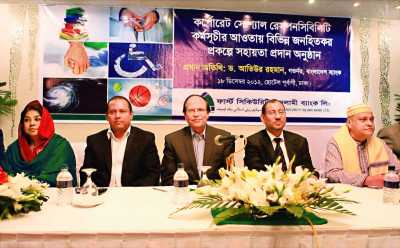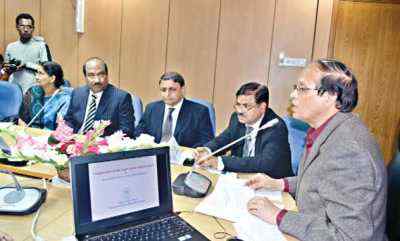Bangladesh Bank
BB issues guideline for electronic money transfer
Bangladesh Bank (BB) has issued guideline for wire transfer or electronic money transfer in line with its continuous effort to check money laundering and encourage fund transfer through official channels.
The guideline, issued last week, stipulated that any transaction of money using swift, mobile phone, credit and debit cards and other electronic media would be considered as wire transfer.
Under the guideline, all banks and other money transferring organisations and agencies should keep detail and meaningful information about the person or organisation transferring at least US$1000 to any other country electronically.
For electronic transfer of Taka 25,000 domestically, the banks and other organisations should keep detail and accurate information about the transferee, and for the amount below Taka 25,000, the meaningful information about the beneficiaries should be kept with the banks.
The organisations, those are offering mobile banking, should use the KYC (know your client) format to keep information about the transferee.
The credit and debit cards issuers will also keep similar information about their clients excepting the payment for buying goods and services.
The guideline is not mandatory for transferring money by government, semi- government and autonomous organisations, the BB said.
News: The Daily Sun/Bangladesh/19th-Dec-12
Banks’ CSR works commendable: BB Governor
 Bangladesh Bank Governor Dr. Atiur Rahman seen at a donation giving function of First Security Islamic Bank Ltd (FSIBL) at a hotel in Dhaka Tuesday.
Bangladesh Bank Governor Dr. Atiur Rahman seen at a donation giving function of First Security Islamic Bank Ltd (FSIBL) at a hotel in Dhaka Tuesday.
The banks spent a total of Tk 2.19 billion in 2011 under their corporate social responsibility works, growing 5 times over the past four years, said Bangladesh Bank Governor Dr Atiur Rahman.
During the current year, the banks have so far spent a praiseworthy amount of over Tk 1 billion on the same purpose, the governor said.
He was addressing a donation giving ceremony of First Security Islamic Bank Ltd (FSIBL) to various philanthropic and social service activities Tuesday at a city hotel.
Managing Director of FSIBL, AMM Zakaria presided over the function also attended by Deputy Governor of Bangladesh Bank SK Sur Chowdhury, Mostofa Jalal Mohiuddin MP, Prof. Abdullah Abu Sayeed, Sagufta Yeasmin MP, Shamsul Haque MP and Mirza Azam MP.
Bangladesh Bank pays special attention to the banks’ corporate social responsibility programmes as such initiatives can help the disadvantaged group come out of poverty, said the central bank governor Dr Atiur Rahman.
He informed that all the banks conduct CSR activities and of them, 20 banks have established separate trust or foundation as CSR has become an integral part of business enterprises globally.
Governor also said reaching banking service and providing credit facility to the hard core poor have already cast a very good impact on the national economy, which even has been reflected in the report of the world famous credit rating organisation Moody’s.
In last four years, the central bank has focused on neglected but productive sectors like agriculture and SMEs, he said.
FSIBL Managing Director said: “The banks’ goal has not limited to only profit-making. They are now conducting huge CSR programmes.”
News: The Daily Sun/Bangladesh/19th-Dec-12
BB launches new software to expedite bond market
 Bangladesh Bank Governor Dr Atiur Rahman speaks at the inauguration of Trader Work Station (TWS) at Jahangir Alam Conference Hall of BB in Dhaka Monday
Bangladesh Bank Governor Dr Atiur Rahman speaks at the inauguration of Trader Work Station (TWS) at Jahangir Alam Conference Hall of BB in Dhaka Monday
Bangladesh Bank (BB) Monday launched a new software to expedite the secondary bond market with offering a more investors’ friendly online platform to buy and sell government securities, including treasury bills and bonds.
Inaugurating the software at a programme at the central bank headquarters in the city, governor Dr Atiur Rahman said this would offer online services to banks, financial institutions and their clients for buying and selling treasury bills and bonds.
The software, known as Trader Work Station (TWS), is already in use in many developing countries for trading of bills and bonds in the secondary market, the governor said.
Besides, he said anyone could have information about the market value of the bills and bonds and their yield, volume and the date of issue and expiry from the website of the Bangladesh Bank.
News: The Daily Sun/Bangladesh/18th-Dec-12
Banking division sends director nominees' list to BB
The Banking Division yesterday sent the names of 29 persons to the central bank who were primarily selected for appointment as directors of state-owned commercial banks (SOCBs) to check whether any of them was loan defaulter.
Among them, five are government officials and the rest 24 are non-government personalities, including economists, business leaders, educationists, former civil servants and bankers.
The appointment will be made today with the banking regulator's clearance, said a high official of the finance ministry.
The list includes some people with political links, but the number of such nominees is lower than previous appointments, the official said.
About 40 posts of directors in different state banks and financial institutions, including 26 with Sonali, Janata and Agrani, remained vacant since the first week of September, as the government failed to make appointments in the banks' highest policymaking panels.
News: The Daily Star/Bangladesh/18th-Dec-12
FCBs yet to be active about SME credit operations
The foreign commercial banks (FCBs) operating in Bangladesh are yet to make any significant contribution to the growth and promotion of small and medium entrepreneurs (SMEs), official sources said.
"Most FCBs are still unwilling to disburse SME loans because of low level of profits out of operations in the sector," a concerned high executive admitted, preferring anonymity.
There is no presence of FCBs outside a few major cities. "We have only some branches in selective urban areas. As a result, the FCBs are not able to get themselves directly involved in credit operations for the SME sector, unlike the other banks," a bank official said.
"All banks should do more for SMEs, which are the economic lifeblood of the country. The more the SMEs will be operationally active, the better the national economy will perform", a Bangladesh Bank's (BB) official said.
The state-owned commercial banks (SCBs), the specialised Banks (SBs), private commercial banks (PCBs) and non-banking financial institutions (NBFIs) are now mostly involved in providing the available credit supports to the SME enterprises.
According to Bangladesh Bank data, during the January-September, 2012, the FCBs could disburse only Tk 10.328 billion among the 2,828 SME enterprises, while the SCBs, PCBs and the SBs made available Tk 28.42 billion among 15,476 SME enterprises, Tk 419.399 billion among 3,26,158 and Tk 26.34 billion among 8,542 such enterprises as credits respectively.
Besides, SCBs disbursed to the women entrepreneurs in the SME sector Tk 765 million among 1,002 entrepreneurs and the PBCs, Tk 13.94 billion among 9,550, the SBs Tk 1.67 billion, among 387 entrepreneurs, the NBFIS, Tk. 784.1 million among 844 such enterprises in January-September, 2012.
During this period, the disbursement of credits to the women SME entrepreneurs stood at Taka 107.8 million involving 689 clients.
The FCBs credit operations were largely concentrated in trading operations instead of service and manufacturing sectors, the bankers said.
"There is no alternative to further development of the SME sector to help accelerate the pace of economic growth as the sector is still the main driving force of the economy," Sukomal Sinha Choudhury, general manager of the SME and Special Programmes Department at the Bangladesh Bank's (BB) told the FE.
News: The Daily Financial Express/Bangladesh/16th-Dec-12



